This post is part of the Great Villain Blogathon cohosted by Speakeasy, Shadows and Satin, and Silver Screenings. Check out other entries on one of their sites!
When it comes to villains, Gregory Anton in Gaslight lacks the theatricality of The Joker or Lecter. He wants the presence of Harry Lime or the narcissism of Ellen Harland. He doesn’t chill the viewer as do Maleficent and Mrs. Danvers. On the surface, therefore, Gregory might not seem a villain worthy of comment. As played by Charles Boyer, the role is so two-dimensional as to approach camp. You can almost hear Boyer saying to himself, “Time for the faux-loving face—wait, too long on that one, stern face time.”
Yes, Gregory seems as commonplace a villain as his name would suggest. But in terms of his effect on his victim, Gregory is a master among villains. Having convinced his new wife, Paula (Ingrid Bergman), to move back to the house where her aunt was murdered, he creates a series of sounds and sights he pretends not to notice. He expresses concern at Paula’s supposedly imaginary observations; he chides her for forgetfulness when items disappear (due to his own actions). She believes him because she loves him. The term “gaslighting,” which originated with this story, refers to Gregory’s sinister brand of psychological abuse: trying to convince his wife she’s going insane. While the motives of his actions are not immediately apparent, he clearly feels no remorse for his cruelty.
So often, we side with the criminal in a plot like this one: with a wife this gullible, it’s easy to go for the laugh rather than the shiver. It would be common too to dismiss Paula as stupid, to fail to sympathize due to her blindness and fragility. But the nineteenth-century timeline of the story counters our usual impulses, making us uneasy and fearful from the start. (Just what were those stories about men committing their wives to asylums on questionable grounds again?) And Paula is not just any victim: She is a victim played by Ingrid Bergman.
Bergman beautifully illustrates the extent of her heroine’s downfall at Gregory’s hands. She is incandescent as a woman in love before his plot takes off.
Her fears about her sanity, which first dim, and then blot out any semblance of happiness or reason, are terrifying to watch. Just when she thinks she can trust in his love for her and have faith in herself again, Gregory cuts off her giddiness with a chilling expression, claims she’s unwell, forgetful, unworthy, childish. Her jealousy of a cruel maid (Angela Lansbury) he flirts with in her own home is nothing, he suggests, but a sign of her sickness.
Think of Betty Draper in the first season of Mad Men, then quadruple the vulnerability, make Don evil rather than sick, take away his love, and remove any right Betty has to defend herself against his duplicity, and you have poor Paula in Gaslight.
Paula’s weakness is her love for her husband; without it to prey upon, Gregory would have no chance of winning this psychological battle against her. And it’s just this level of cruelty she can’t accept. Of course she finds her own forgetfulness more believable. Not content with the damage he’s done, Gregory shuts her away from others, guaranteeing she spends most of her time obsessing over whether she’s mad–hardly a healthy pastime. How long, we wonder, CAN Paula stay sane, trapped in a loveless marriage, a frightening house, and fears she can no longer control? While there’s hope in the form of a suspicious detective (Joseph Cotten), even if Paula escapes, can anyone recover from this kind of treatment?
Despite a largely passive performance, Bergman is stunning to watch in Gaslight. I can think of no actress but Meryl Streep who could accomplish so much with just expressions, who could deliver enough pain and fear to carry the film and beat out Barbara Stanwyck, Bette Davis, Claudette Colbert, and Greer Garson for the Oscar.
Just a few years after Gaslight, Bergman would fall for Roberto Rossellini and become involved in an affair with him so scandalous Congress and many of her American fans would condemn her. But she would make a Hollywood comeback less than a decade later, and her union with the famous director would result in a daughter, Isabella, who, in a curious twist, would make a splash of her own as a victim in another famous film, Blue Velvet. Who could forget torch singer Dorothy Vallens, the target of creepy villain Frank Booth (Dennis Hopper)?
Be sure to check out the other villains in the blogathon!

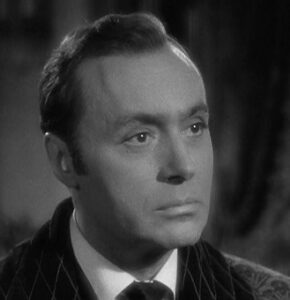
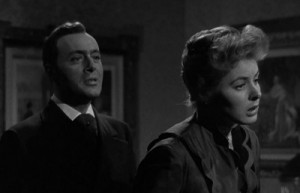
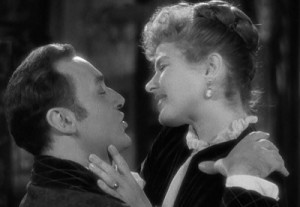
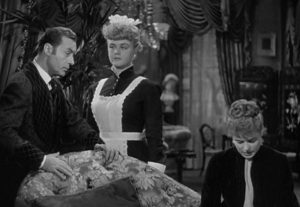
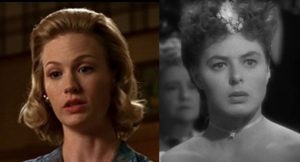
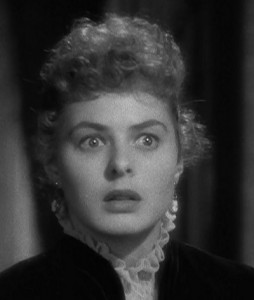
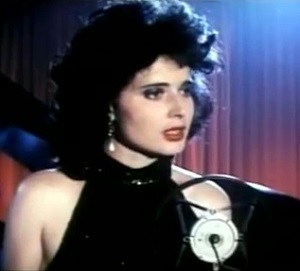
This is one of the films that had a huge impact on the way I think about “crazy.” It’s a really, really good film.
I agree. Even though Gregory is causing her supposed delusions, the fear of forgetting/confusing throughout really helps us understand how terrifying it would be. Leah
Great review. Boyer’s character is totally heartless. A great villain.
Ingrid’s scene with him at the end makes you want to shout out and cheer her.
Thanks! Yes, it’s one of the most satisfying endings I’ve seen. I always want to skip right to it:) Leah
Great review. Angela Lansbury is so great in this movie, and so young!
Yes, you could see why she’d be so brilliant in The Manchurian Candidate right from the start of her career:)
This is one of my fave films because of the things you pointed out – Ingrid Bergman’s expressive face and the deceptively chilling Charles Boyer.
I agree with the previous commenter re: Ingrid’s last scene with Boyer. I want to stand and cheer every time.
Thanks for participating in the blogathon and profiling this exceptional film.
Thank you for including me in it! It’s been so much fun.
Leah
this is one of the first classic movies I saw, and what a memorable one to see so early on. Ingrid was one of the very best and this is a fine example of why. Boyer seems to do little but played so well on his romantic image and spun it to something so creepy. Nice pick and thanks for contributing!
Thank you. It’s true–his romantic image makes this performance especially creepy.
I’ve only seen this on stage and in the 1940 British film with Anton Walbrook and Diana Wynyard, which was on TV in the UK recently and is powerful stuff, but hope to get the chance to compare this version soon. Bergman and Boyer are both great and you make it sound like a must.
Yes, don’t miss it! I’d have loved to have seen this on stage…
I love Bergman and this movie. I always though this movie and The Spiral Staircase would make a great double feature.
John,
I haven’t seen that one. I just read the description on IMDB and it sounds a bit like Wait Until Dark. Thanks for the rec!
Leah
I really like how you explained that the reason she couldn’t believe he was the problem was because she loved him so much. It was easier for her to think she was losing her mind. Great insight! This is one of my favorite movies, also. My husband and I often tease each other when we can’t find something that maybe it is with the picture, referring to this film. It is one that has haunted me ever since I first saw it, and it was fun reading your post about it.
Thank you! I like that. I claim to have mad cow when I forget something–but I like how I could use this term gaslighting to blame it on my husband.:) Leah
What’s so chilling to me is how Boyer gets Bergman to be completely, utterly dependent on him while slowly isolating her from everyone else…so scary! It’s so easy to see how she would start to think that she was mad since the one person in her life, the man she loves and trusts, conspires against her! Boyer is such a clever, sadistic villain! Thanks for a great review!
Exactly. And he SEEMED so in love with her too. Usually, we’d be sad to see her, Rebecca-like, questioning his love for her over and over again. Instead, we have her wishing she would. Thanks! Leah
Although I love Bergman, it’s Boyer that makes Gaslight for me. I didn’t expect him to be such a convincing villain but I’m always glad he proved me wrong!
You know, I’ve always given her complete credit, but it’s true that he’s riveting to watch. Perhaps I haven’t given his performance enough attention:) Leah
I greatly enjoyed your write-up on Gaslight, one of my favorite films. It’s one of those that I always have to watch to the end whenever I happen across it. I also have grown to appreciate Charles Boyer’s villainy more with each viewing — he’s really awful!
Thanks, Karen. I hadn’t watched it in a few years and was surprised when I watched it again how much I remembered. I think it’s just that wonderful & creepy. I flinched the first time I saw him again on the screen. Leah